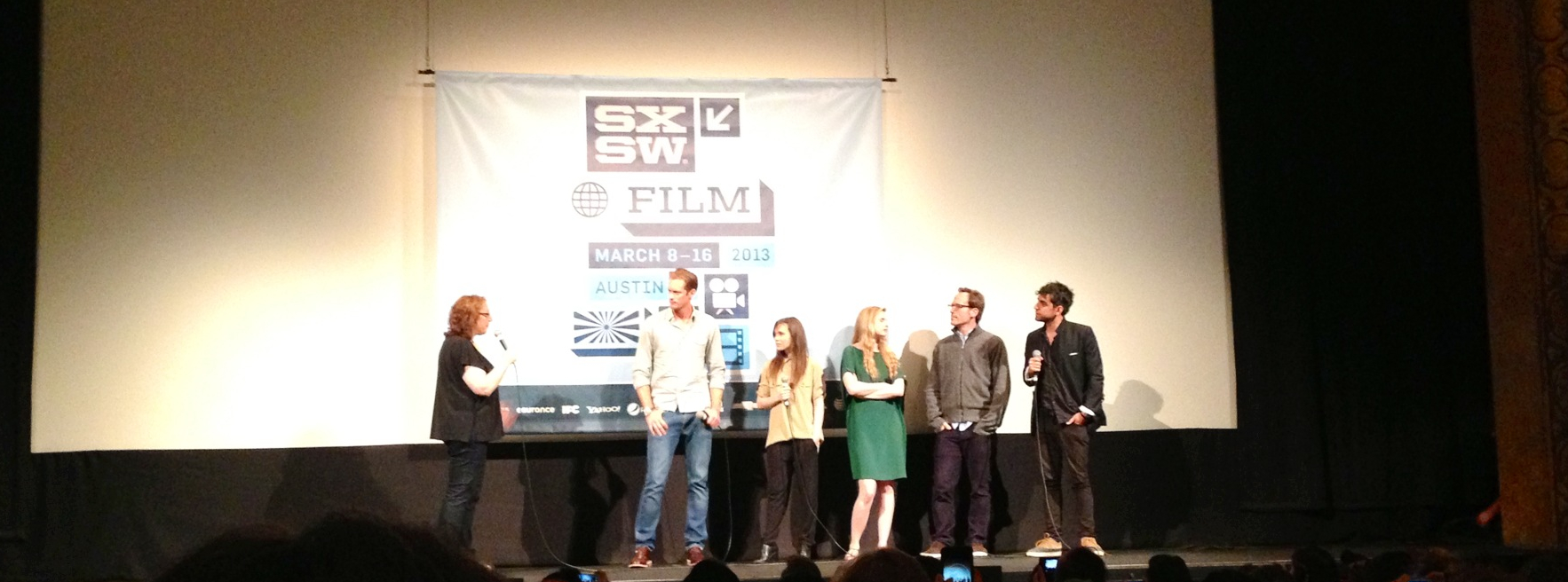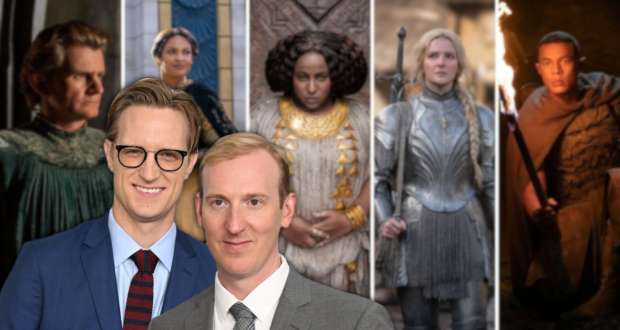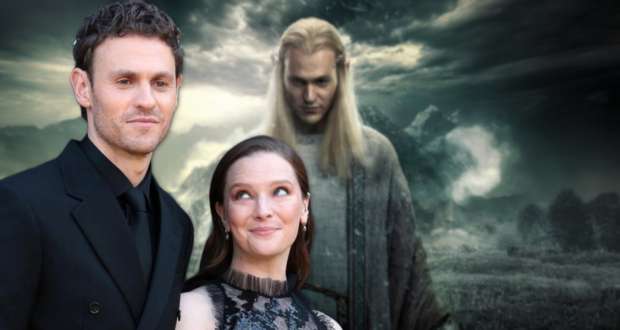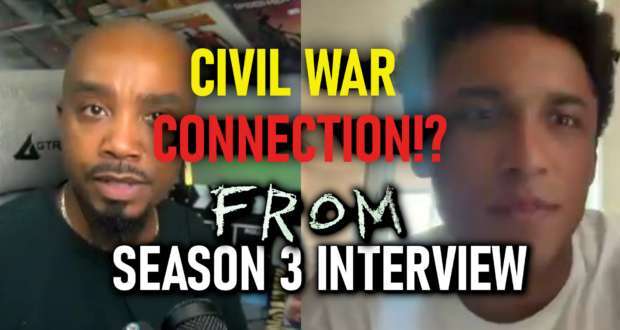Zal Batmanglij and Brit Marling, the filmmaker duo behind Sound of My Voice, collaborated on their follow-up feature The East, which is a smart and edgy thriller, opening in theaters this summer. It played to an enthusiastic crowd as the closing night feature at the SXSW Film Festival last month. I sat down with director Zal Batmangli and star/co-writer Brit Marling, as well as co-stars Ellen Page (Juno) and Alexander Skarsgard (TV’s True Blood), to discuss the implications a movie like The East conjures up for the viewer.
Two obvious differences between Sound of My Voice and The East were the budget and set locations. Sound of My Voice was filmed in a handful of location on a shoestring budget while The East had many more locations and a significantly larger budget. Batmanglij and Marling work well together, bonded by a brother-sister chemistry and a mutual respect for each other. It is this mutual trust that kept them well-balanced while making The East. Surprisingly, the issue of working with a larger budget was something Batmanglij didn’t really notice.
Batmanglij: Looking back on it you can tell [The East] is a bigger budget movie, but it didn’t feel that different. Whether you have 20 people behind you or 80 people behind you, all that matters is what you have in front of you, the two or four people that are actors.
It’s simply a movie-making process.
Batmanglij:You just do it one step at a time, whether you’re making a $100,000 movie or a $7 million movie . . . but at the end of the day, it’s putting one foot in front of the other. I didn’t actually notice that much of a difference shooting.
In the spring of 2010, Batmanglij and Marling tried to raise a little under a million dollars for The East. These filmmakers followed in the footsteps of their characters to go rogue and underground in order to gain financial backing for the movie. They purchased USB drives to hold the project as it evolved and left them in random places for anyone to find and provide input. And they spent weeks train-hopping, dumpster-diving and food-making for a hundred people as research on the underground culture they were describing. Marling’s own world view was challenged from studying the unconventional lifestyle her character lived.
Marling: It’s all so strange and weird at first. But at some point you cross over and you’re like, ‘wait — is this strange and weird or is it strange and weird that so much good food is being put in a blue box behind a store and then it disappears? Is it strange and weird that our culture produces so much waste that actually isn’t waste? Is it strange and weird that we don’t talk about it?’
Making The East opened Batmanglij’s eyes about how selective and sheltered American society is as a whole.
Batmanglij: I think in the age that we live in, there are alternate point[s] of view available to us through the Internet that actually we have become less open-minded and more resistant to seeing things from other perspectives. Because our own perspective is being refined all the time and we are seeing access to all subcultures, subgenres, but as in terms of information as actual experience. I think we get confused and think that is experience. So we were really fascinated with telling a story about perception.
Marling mentioned the conflict from the point of view of Sarah, the character she plays, and how that conflict reflects her inner battle.
Marling: This is why Sarah’s experience is so interesting. She is living this dual life. Going back and forth, she loves her boyfriend, her job, her boss, and then she also has this experience with this group that keeps changing her perspective. It’s hard because I think we still have those dual identities. I think we all are warring with dual sides of ourselves.
When I asked Marling if her experience of studying economics at Georgetown and turning down a lucrative investment job at Goldman Sachs had an influence over her screenwriting for The East, where big corporations are portrayed as unaccountable villains, she was able to see a correlation.
Marling: I think it did in the sense that I understood what it was like to be really devoted to one way of seeing things and to let just your desire to work and be involved and to drive you into a direction without looking too much into what that means for other people or even yourself.
Marling’s unhappiness in life was the direct result of picking a career not truly matching her skill set. She faced raw emotions of not connecting with her work and questioned her own state of mind.
Marling: I remember I was so unhappy with what I was doing that I was crying the whole time after work. Is there really a chemical imbalance in my brain or am I not liking what I do for a living? And that’s the question you have to answer for your life.
Batmanglij designed the narrative structure of The East to process real-world problems that have plagued an apathetic society.
Batmanglij: The overall feeling I have is frustration. And that frustration inspired us to tell a story when we work out in fiction the idea when a group of people were holding people accountable for these stories we read about. We have become so desensitized to accountability. We read these stories and say, ‘oh well.’ But there are people responsible for these things. There is someone who could be held accountable . . . it was something worth exploring in fiction for us.
Alexander Skarsgard, who plays Benji in The East, referred to keeping a cool, calm and collected attitude on a set of the grim movie Melancholia Despite the film’s pessimistic and depressing subject matter, he carried the same attitude in order to keep a level head on set of The East.
Skarsgard: We had so much fun every weekend, a big party. Between the set-ups on set it was a fun, happy set. And a lot of people don’t think that’s the case. It’s so dark and so heavy you need to counterbalance
Skarsgard: We kind of became The East.
Skarsgard immediately wanted to work with Marling and Batmanglij when he saw the subtlety and complexity of their writing.
Skarsgard:“It’s an amazing script, and that doesn’t happen often in Hollywood. It’s rare and far and few between when you get a script like this in your hands, and one that’s [so well-written and smart and relevant, all in an interesting script.
Ellen Page, who plays Izzy in The East, felt a connection with the material because she saw parallels to turbulent global events. As an actress who typically works only on quality movies, this seemed like an ideal fit for her.
Page: I think it’s pretty evident right now and I think a lot of people are feeling the constant atrocities in the world and the lack of accountability for pretty horrific things that happen. Whether it’s corporate greed or what we are doing to the environment or the collapse of the economic system, there is just no accountability. The people who are suffering the most are the people who don’t have much. I can see why people are angry.
Page seems to make cautious and smart choices in selecting material and working with top directors like Jason Reitman, Christopher Nolan, and Woody Allen. Collaborating with an emerging talent like Zal Batmanglij was an ideal fit for her personality and she felt immediate trust with him.
Page: He knows what he wants but is open to hearing what you have to say. He makes you feel incredibly safe with what you’re doing. I think trust is really important in that I like being able to trust in someone and I want to give them what they want . . . He was someone I felt immediate trust with and I loved the experience of working with them.
Skarsgard described how Batmanglij provided a positive environment that allowed his actors to express themselves freely, including showing their own imperfections. Skarsgard said Batmanglij provided an atmosphere of “feeling safe and feeling that you’re allowed to be bad and make mistakes.
Skarsgard: You’re comfortable and confident enough with a director that you can do that. It’s very important for a director to instill that on his or her actors. You feel that you don’t always have to play it safe and you can go to weird places to try new things that might not work. You’re surrounded by people you feel safe with.
Page and Skarsgard both have fan bases they believe will show up to see The East. However, they don’t want attention to be directed solely toward them. They want the audience to connect with the script Batmanglij and Marling wrote.
Page: I know I am a very tiny equation. A lot of people have put a lot of work into the product you are going to watch. I like the experience of seeing how things come together. This movie in particular — and probably because I care about Zal and Brit — I want it to do well for them. I think watching this film with an audience is special to watch because it has this relentless suspense to it.
Skarsgard agreed and expressed passion for the final product.
Skarsgard: We loved the experience of working on it and are passionate about the film. It’s an amazing feeling. When you feel the way the audience connects with what we did, it’s extremely rewarding.
The one impression people are sure to take with them from watching The East is its exploration of deep ethical and moral issues to ponder long after the credits end. Page understands the complexity of the project and wants the audience to discover meaningful connections to current events.
Page: I think this film presents a lot of questions. I think this movie is incredibly ethically murky. These are the kind of movies I would want to see and those are the movies I want to feel myself shifting in them. I think the movie is talking about a lot of things that are in the general zeitgeist of the moment, a lot of things that are constantly in the news and looking at it in a slightly different way. Hopefully then other people can connect to it too and leave and have a conversation with their friends and explore new seeds of ideas.
The East opens in New York and Los Angeles on May 31st with a limite release rollout during the month of June.
























